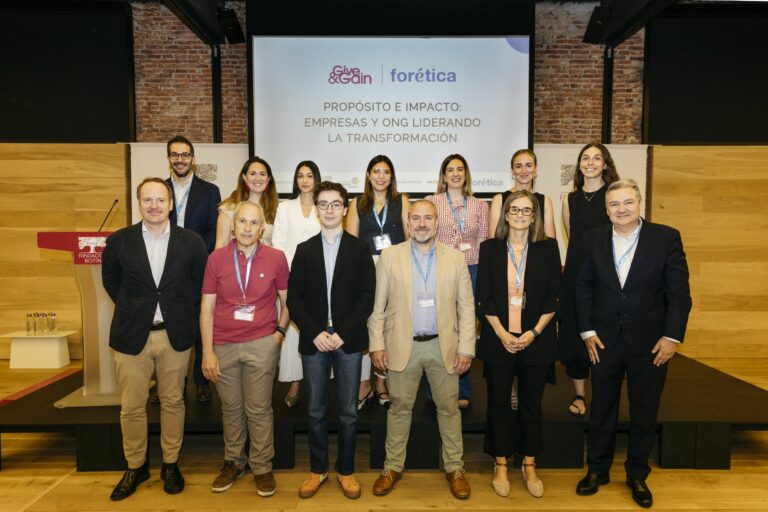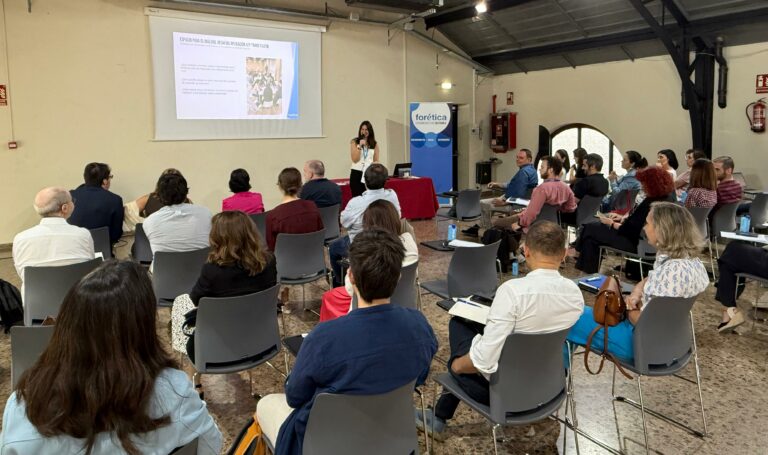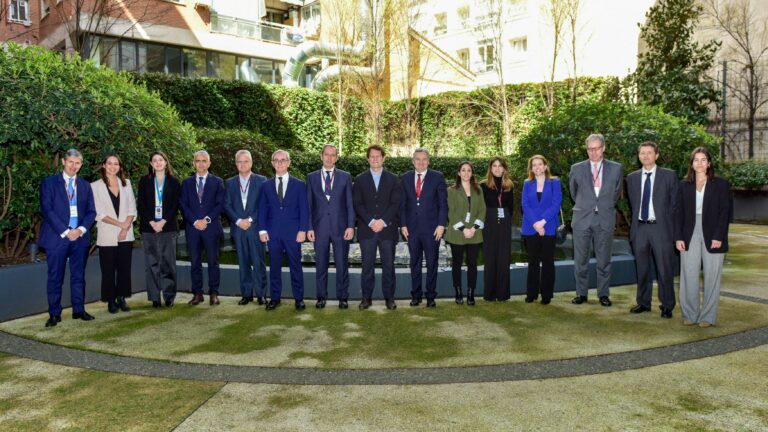Antes del inicio de la COP25 de Cambio Climático en Madrid, que tendrá lugar del 2 al 13 de diciembre, el Consejo Empresarial Mundial para el Desarrollo Sostenible (WBCSD) ha publicado las peticiones clave del sector privado para los negociadores de la COP25.
El Informe especial del IPCC sobre el calentamiento global de 1,5 °C publicado en octubre de 2018, envió una señal clara: los impactos de permitir que el calentamiento global alcance los 2 °C por encima de los niveles preindustriales son mucho mayores y más catastróficos que 1,5 °C –que se espera sean superados ya en 2040. El informe afirma que, si bien aún es posible un mundo a 1,5 °C, requerirá una transformación radical y urgente de todos los sistemas económicos a una escala sin precedentes.
Esto implica avances urgentes hacia sistemas de energía, transporte y medio ambiente construidos sin carbono, y un sistema terrestre que pueda alimentar al planeta mientras protege los ecosistemas vitales y elimina la presión de los hábitats salvajes y la biodiversidad. Esta transición a un futuro resiliente y sin emisiones de carbono puede generar enormes beneficios para nuestras economías, la sociedad y la naturaleza.
Maria Mendiluce, Directora Gerente del WBCSD para Clima y Energía, Economía Circular y Ciudades y Movilidad ha destacado que “la ciencia es clara: debemos acelerar la transformación de los sistemas a escala para mantenernos dentro del espacio operativo seguro de 1.5 grados. No hay más tiempo que perder. El WBCSD y sus empresas miembro están pidiendo a los gobiernos que adopten compromisos alineados con 1,5 grados y emisiones globales netas cero para 2050, incluidas medidas de gran alcance para poner un precio al carbono, garantizar una transición justa y crear resiliencia a los impactos del cambio climático».
A continuación, se presentan las expectativas de las casi 200 compañías miembro del WBCSD respecto a las conversaciones que tendrán lugar en la COP25, con el objetivo de encaminarnos hacia el logro de los objetivos del Acuerdo de París.
- Aumento de la ambición hacia 1,5 °C y una economía global neta cero
- El liderazgo por parte del sector empresarial
- El precio del carbono y los mecanismos del Artículo 6
- Resiliencia
- Financiación
- Transición Justa
- Naturaleza
- Aumento de la ambición hacia 1.5 ° C y una economía global neta cero
Instamos encarecidamente a los países a que fortalezcan su acción climática y aumenten sus compromisos nacionales para asegurar emisiones netas cero globales lo antes posible en la segunda mitad del siglo y crear sociedades resilientes al clima. Las economías desarrolladas, cuyo liderazgo es esencial, deben establecer planes para lograr esto para 2050 a más tardar.
En este año crucial para la acción climática, el WBCSD y sus compañías miembro hacen un llamamiento a los gobiernos para que demuestren su compromiso con la acción climática y el Acuerdo de París anunciando claramente su intención de fortalecer las metas a 2025 y 2030 de las contribuciones determinadas a nivel nacional (NDC), y desarrollar o actualizar sus estrategias de bajas emisiones de gases de efecto invernadero a largo plazo (LTS, por sus siglas en inglés) compatibles con una vía de 1,5 °C y emisiones netas cero para 2050.
- El liderazgo por parte del sector empresarial
Las empresas líderes en todo el mundo están asumiendo compromisos climáticos ambiciosos dentro de sus operaciones, y en sus cadenas de valor alineadas con 1,5 °C y la ambición de lograr una economía global Net-Zero.
Las empresas y los gobiernos líderes pueden trabajar juntos para crear lazos de ambición climática que se refuercen positivamente con políticas gubernamentales ambiciosas y fuertes que den claridad y confianza a las empresas para invertir decisivamente en productos, servicios y soluciones con cero emisiones de carbono. Estos bucles de ambición aceleran la transición a un mundo sin carbono.
- Precio del carbono y los mecanismos del Artículo 6
La fijación de precios del carbono es uno de los medios más eficaces y rentables para impulsar vías de descarbonización profunda en todas las economías. El WBCSD y sus compañías miembro creen que los mecanismos de fijación de precios del carbono son críticos para respaldar los esfuerzos urgentes necesarios para impulsar la transición hacia un futuro con bajas emisiones de carbono y lograr el objetivo de 1,5 °C.
Creemos que las políticas efectivas de fijación de precios del carbono que aseguran la integridad ambiental son un medio de bajo coste para lograr reducciones profundas de emisiones al tiempo que mantienen la competitividad, crean empleos, fomentan la innovación, permiten la inversión, crean valor para las soluciones y minimizan los costes sociales. Estas soluciones corrigen los problemas actuales al aplicar el principio de quien contamina paga para abordar el cambio climático, internalizando así los costes de la contaminación por carbono en los precios. En combinación con otras intervenciones políticas directas, el establecimiento de precios del carbono puede garantizar una transición sin problemas hacia una economía baja en carbono.
- Resiliencia
Si bien aumentar la ambición de mitigación es fundamental para contener el calentamiento global a 1,5 °C, debemos desarrollar resiliencia a los impactos climáticos que no podemos evitar. Las empresas están construyendo estrategias de resiliencia para abordar los riesgos climáticos, integrándolos en prácticas de gestión de riesgos, planes de continuidad comercial y planes de crecimiento e inversión. Hacemos un llamamiento a los gobiernos de todo el mundo para desarrollar resiliencia a los impactos climáticos para las comunidades que sustentan las cadenas de valor en todo el mundo.
- Financiación
Para lograr una transición acelerada hacia una economía con cero emisiones de carbono, los mercados necesitan información completa sobre los riesgos y oportunidades climáticas, y señales y políticas de precios claras para permitir que los flujos financieros globales cambien urgentemente hacia inversiones en innovación y tecnología destinadas a lograr una economía neta cero tan pronto como sea posible.
- Transición justa
Hacemos un llamamiento a los gobiernos para que apoyen una transición justa en toda la economía a emisiones netas cero a través de facilitar el diálogo social con empresas, trabajadores y comunidades para garantizar que los trabajos decentes cumplan con altos estándares laborales, e integrando las medidas descritas en la Declaración de Silesia de Solidaridad y Transición Justa en los NDC y planes nacionales de clima y energía.
- Naturaleza
Nuestros bosques, praderas y humedales pueden secuestrar y almacenar carbono proporcionando una oportunidad única para ayudar al calentamiento global a mantenerse dentro del límite de 1,5 °C. Pero los esfuerzos para abordar estos problemas aún están fragmentados. Hay una falta de urgencia y necesidad de formulación de políticas más coordinada y coherente.
Para obtener información más detallada sobre las peticiones clave del sector privado a los negociadores en la COP25 puedes descargar el pdf aquí














Déjanos tu comentario